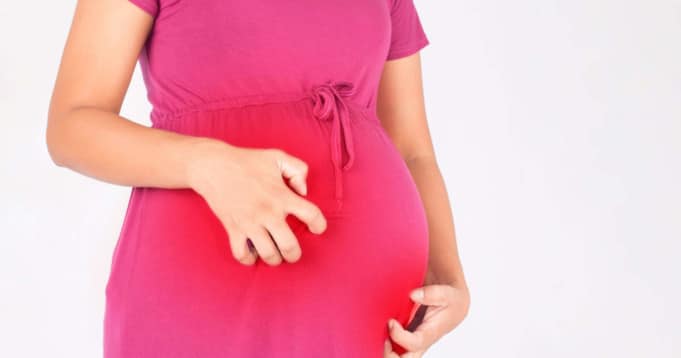Intrahepatic Cholestasis of Pregnancy (ICP), also known as Cholestasis of pregnancy is as a result of a common liver disease that happens during pregnancy. The liver is the largest organ that helps with the digestion of food and getting rid of toxic substances from the body.
When the liver is damaged, it affects the normal flow of bile. The bile is produced by the liver that helps with the digestion of lipids in the small intestine. Intrahepatic Cholestasis of pregnancy can be very discomfort and cause itchy in both the hands and feet.
Intrahepatic Cholestasis of Pregnancy can happen to any pregnant woman at any time of pregnancy but occur mostly in the third trimester of pregnancy. This ICP can be mild but in a severe case, it can affect both the mother and the child if not taken care of immediately. It can also lead to a preterm birth or stillbirth.
Symptoms of Intrahepatic Cholestasis of Pregnancy.
- Itching: This is the most common and major symptoms of ICP. The itching affects all parts of the body, but it mostly affects the palm of the hands and the sole of the feet. Itching can get worsen at night and might not even occur during the day at all. It comes without a rash
- Dark Urine: This occur because of the biochemical changes in the body during ICP. It changes the colour from apple juice to dark brown.
- Liver Pain: This is a severe pain that you feel beneath the tip of the right shoulder blade. Since the bile is affected, there is no means of sending pain. The bile helps to sense pain.
- Pale stool( bowel movement): On a normal functioning of the body, the bile gives the stool it’s distinctive colour but since there is abnormal flow of bile due to intrahepatic cholestasis of pregnancy the stool appears pale grey or light.
- Nausea/ appetite loss: Due to the condition (ICP), you may find it difficult to eat and there will be more urge to vomit
Other symptoms
Some Intrahepatic cholestasis of pregnancy symptoms are rare or less common. These symptoms may include:
- Fatigue: Though, this is a normal symptom of pregnancy, but it can also be a symptom of this condition (ICP) when there is intense fatigue.
- Mild depression: Due to the itches, urges to vomit, lack of sleep etc. Can lead to mild depression.
- Jaundice: Your skin color begins to change from the normal colour to yellow, while the eyes becomes white in colour.
Causes of Intrahepatic Cholestasis of Pregnancy (ICP)
Doctors do not know the cause of ICP but there are so many things that plays the role of ICP in the body and can be considered as causes.
- Gene: There might be a family history of ICP.
- Pregnancy Hormones: When the hormones increase, it may reduce the flow of bile out of the liver.
- If you had Intrahepatic Cholestasis of Pregnancy in a previous pregnancy, it may likely to re-occur in another pregnancy.
- Also, carrying multiple children like twins or even more can be a risk factor of ICP.
- If you had a liver damage or disease like hepatitis C, it could also cause ICP. Hepatitis C causes the liver to swell up.
- Affected bile can also be a cause of Intrahepatic Cholestasis of Pregnancy.
Diagnosis of Intrahepatic Cholestasis of Pregnancy
Intrahepatic Cholestasis of Pregnancy (ICP) can be diagnosed by series of blood tests.
- Liver function test: This is a blood test that helps detect the state and function of your liver
- Serum bile acid test: This also detects the function of the liver and also if the bile is moving properly through and out of the liver.
- Prothrombin time test: This is a blood test that detects bleeding problem in your body and also helps to measure how your blood cloth.
Some test is done to monitor your baby’s health.
- Non stressing test: This test is done to know the heart rate of the baby.
- Fetal biophysical profile (BPP): This test is done to know the breathing, movement, muscle tone of the baby.
Treatments of Intrahepatic Cholestasis of Pregnancy
The main reason of treatment of the condition ICP, is to reduce the itches and avoid some complications during or after delivery.
- To reduce or relieve you from itchy, your doctor may prescribe a medication called ursodiol which is also known as Ursodeoxycholic acid. Ursodeoxycholic acid helps to reduce the level of saturation of bile. This medication is important during ICP because it improve the function of the liver and also protects the baby from any complications or risk factor.
- Your doctor may likely suggest Vitamin K intake because it can avoid hemorrhage during delivery. Hemorrhage is a heavy release of blood within or from the body.
- Your health care provider can also suggest Dexamethasone. Dexamethasone is a member of glucocorticoid-class of steroids hormones. This helps to increase the maturity of the baby’s lungs so the baby can breathe well or better after birth.
- Induce Labour: After monitoring the condition of the baby by undergoing some test, your healthcare provider may suggest a medication for labour induction before the due date of delivery. That is, you are likely to have a preterm birth.
- Surgery: Your doctor may suggest surgery if the case or condition is critical… if there is an obstruction of backup bile
There are some home remedies that can be done to reduce Itching before going to the hospital, if the itchy persist.
- Soak yourself in a lukewarm or cool water.
- Apply ice on the affected area
- Apply a cream or soothing lotion that might have been prescribed to you by your doctor to control itching.
Conclusion
Cholestasis of Pregnancy, is treated to avoid complications like fetal distress, stillbirth, respiratory distress syndrome etc.
Note that as an ICP patient you are to avoid antihistamine or corticosteroids creams to reduce itching. And any medication you want to use, make it known to your heath care provider.
Sources:
- Intrahepatic cholestasis of pregnancy; healthline.com
- Causes of ICP; mayoclinic.org
- Symptoms of ICP; wikipedia.org and nhs.uk
- Treatments of ICP; ICP care.
- Intrahepatic Cholestasis of pregnancy; marchofdimes.org












